Root Canal Retreatment
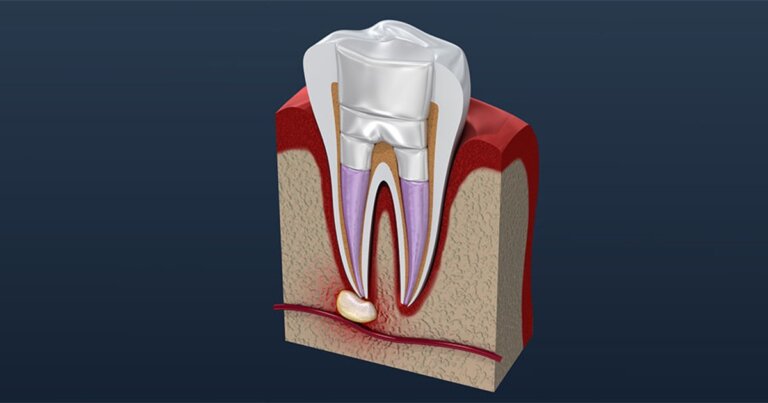
What Is Root Canal Retreatment?
Root canal treatment is a common dental procedure designed to save a tooth that has been damaged by infection or trauma. In this procedure, the infected pulp of the tooth is removed, and the hollow space is cleaned, disinfected, and sealed. While root canals are typically successful in treating infections and preserving the tooth, there are times when additional treatment is needed. This is where Root Canal Retreatment comes in.
Root Canal Retreatment is a procedure aimed at addressing issues that may arise after a tooth has undergone initial root canal treatment. In some cases, the tooth may not heal fully, or new problems may develop. Root canal retreatment involves reopening the treated tooth, cleaning out the infected material, and sealing it again to promote healing so as to avoid tooth extraction.
Before deciding on whether Root Canal Retreatment are right for you, there are some things you should know:
- Who Needs Root Canal Retreatment?
- Benefits Of Root Canal Retreatment
- Alternative Treatments To Root Canal Retreatment
- How Much Does Root Canal Retreatment Cost?
- Steps In The Root Canal Retreatment Procedure
- Frequently Asked Questions About Root Canal Retreatment
If you have any further questions about Root Canal Retreatment or other dental services offered at Atlas Dental, please contact us.

Free phone consultation
Have questions about root canal retreatment? Schedule a free phone consultation with our Toronto dentist.

5 star google reviews
See for yourself why more and more people are choosing our dental office for root canal retreatment.

Emergency dental care
Have a toothache in Toronto and think you need root canal treatment? Book online for same day exam and treatment.
Who Needs Root Canal Retreatment?
Root canal treatment is often successful, but there are several scenarios where a tooth may require retreatment:
- Persistent Symptoms: If pain or sensitivity to hot or cold continues after treatment, or if swelling around the treated tooth persists, retreatment may be necessary. These symptoms could indicate a reinfection or undetected bacteria in the tooth.
- Delayed Healing: Sometimes, a tooth doesn’t heal properly due to complex anatomy or undetected issues in the root canal system.
- New Infections: A tooth that has already had a root canal can still become infected again if bacteria manage to reinfect the tooth.
- Fractures or Cavities: Teeth that have undergone a root canal can still develop cracks or cavities, which might require retreatment to save the tooth.
If you’re experiencing any of these signs, consult with your dentist to determine if root canal retreatment is needed. If you have further questions about Root Canal Retreatment, please contact us.
Benefits Of Root Canal Retreatment
Root canal retreatment offers several benefits, including:
- Preserving Your Natural Tooth: One of the main reasons to consider root canal retreatment is to avoid extraction. Keeping your natural tooth helps maintain normal biting and chewing functions and prevents further dental complications.
- Cost-Effectiveness: Root canal retreatment is generally less expensive than extracting a tooth and replacing it with a dental implant or bridge.
- Preventing Jawbone Loss: Retaining your tooth can help prevent bone loss in the jaw, which can occur when a tooth is extracted.
- Natural Look and Feel: Your natural tooth provides the best cosmetic and functional outcome compared to implants or bridges.
- Less Invasive: Compared to tooth extraction and the placement of an implant, root canal retreatment is minimally invasive and typically involves less recovery time.
If your dentist recommends retreatment, it could be the best option to restore your tooth and avoid more complex procedures. If you have further questions about Root Canal Retreatment, please contact us.
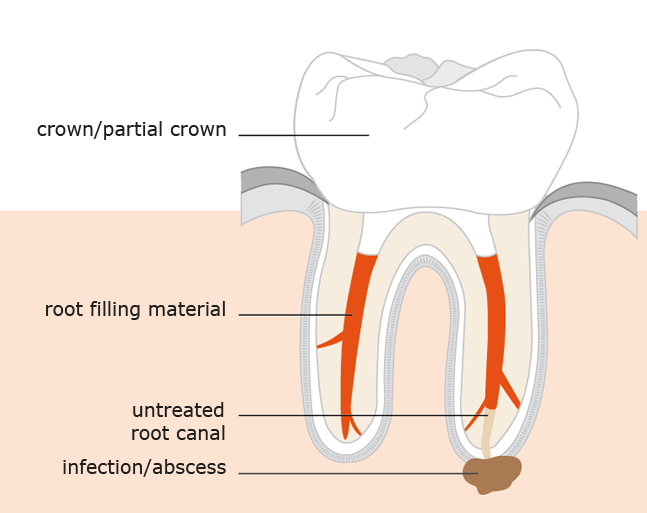
Alternative Treatments To Root Canal Retreatment
If root canal retreatment isn’t the right option for you, several alternatives exist:
- Tooth Extraction: If the tooth cannot be saved, extraction may be necessary, followed by a tooth replacement option like a dental implant or bridge.
- Dental Implant: A titanium post placed in the jaw to replace the missing tooth, offering a long-term, durable solution.
- Dental Bridge: A bridge uses adjacent healthy teeth to anchor an artificial tooth, providing a replacement for the extracted tooth.
- Apicoectomy: A surgical procedure that removes the tip of the root to eliminate infection that persists after root canal treatment.
Discuss these alternatives with your dentist to determine the best option based on your specific dental needs. If you have further questions about Root Canal Retreatment, please contact us.
Cost of Root Canal Treatment
The cost of Root Canal Treatment can range from $732 to 1579. It will depend on the number of canals (ranging from 1 to 4 or more), as well as other complicating factors (such as difficult access, exceptional anatomy, calcified canals or retreatment). The codes relevant to root canal treatment in the Ontario Dental Association’s Suggested Fee Guide appear as follows:
Root Canals, Permanent Teeth/Retained Primary Teeth, One Canal
- 33111 – One canal: $732
- 33112 – Difficult Access: $817
- 33113 – Exceptional Anatomy: $817
- 33114 – Calcified Canals: $817
- 33115 – Retreatment of Previously Completed Therapy: $870
Root Canals, Permanent Teeth/Retained Primary Teeth, Two Canals
- 33121 – Two canals: $906
- 33122 – Difficult Access: $941
- 33123 – Exceptional Anatomy: $941
- 33124 – Calcified Canals: $941
- 33125 – Retreatment of Previously Completed Therapy: $1048
Root Canals, Permanent Teeth/Retained Primary Teeth, Three Canals
- 33131 – Three canals: $1209
- 33132 – Difficult Access: $1388
- 33133 – Exceptional Anatomy: $1388
- 33134 – Calcified Canals: $1388
- 33135 – Retreatment of Previously Completed Therapy: $1397
Root Canals, Permanent Teeth/Retained Primary Teeth, Four or More Canals
- 33141 – Four or more canals: $1412
- 33142 – Difficult Access: $1579
- 33143 – Exceptional Anatomy: $1579
- 33144 – Calcified Canals: $1579
- 33145 – Retreatment of Previously Completed Therapy: $1579
Root canal therapy is sometimes considered a supplementary service by dental insurance plans and may or may not be covered by your dental insurance. Be sure to find out from your dental insurance plan provider how much you are eligible for before going ahead with dental treatment. Our fees are consistent with the ODA Fee Guide.
For patients without dental insurance, Atlas Dental is pleased to offer dental financing through iFinance Dentalcard. Affordable payment plans start at 7.95% for terms of 6 months to 6 years. To learn more about Dentalcard dental treatment financing, follow this link.
Steps In The Root Canal Retreatment Procedure
Root canal retreatment involves several key steps:
- Assessment and X-Rays: Your dentist will assess the condition of your tooth and take X-rays to guide treatment.
- Anesthesia: Local anesthesia is applied to numb the area around the tooth.
- Access Opening: The dentist will create an opening in the tooth to access the root canal system.
- Cleaning and Disinfection: The root canals are thoroughly cleaned and disinfected to remove any infected tissue.
- Filling and Sealing: After cleaning, the canals are filled with a biocompatible material, and the tooth is sealed.
- Restoration: Depending on the tooth’s condition, a permanent restoration or crown may be placed.
Following the procedure, you’ll have follow-up appointments to monitor the tooth’s healing and success of the treatment. If you have further questions about Root Canal Retreatment, please contact us.
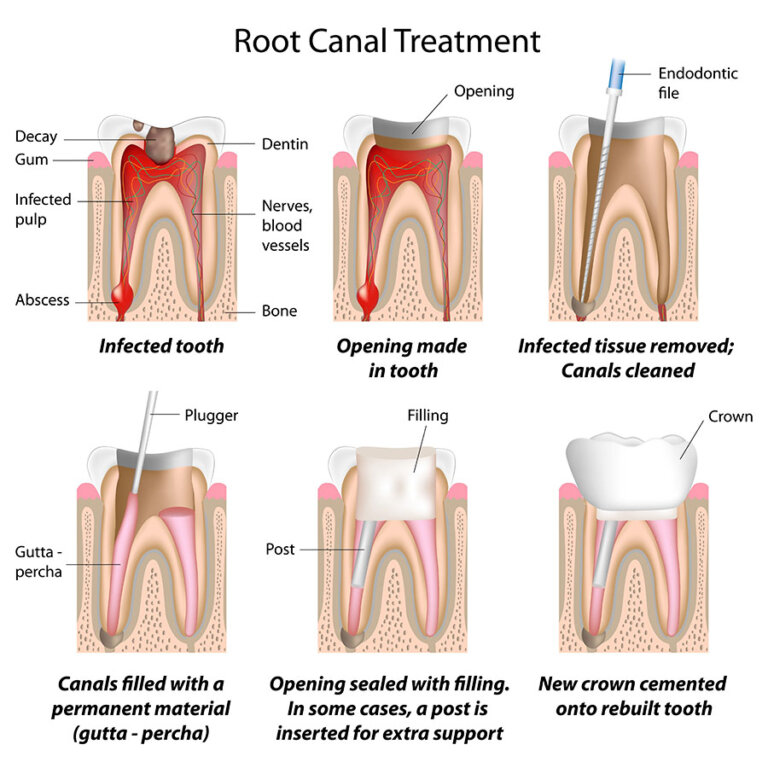
Frequently Asked Questions About Root Canal Retreatment
- How long does root canal retreatment take?
Root canal retreatment typically takes 1 to 2 hours, depending on the complexity of the case.
- Is root canal retreatment painful?
While you may feel some discomfort after the procedure, local anesthesia is used during the treatment to ensure you are pain-free.
- Will dental insurance cover root canal retreatment?
Many dental insurance plans cover part or all of the cost of root canal retreatment. Check with your insurance provider to understand your coverage.
- Can I have root canal retreatment while pregnant?
It is generally safe to undergo root canal retreatment during pregnancy, but it’s important to discuss any concerns with your dentist and obstetrician to ensure the safety of both you and your baby.
At Atlas Dental, our team is committed to providing high-quality dental care and ensuring the best possible outcomes for our patients. If you’re experiencing persistent tooth pain or discomfort after a root canal, contact us for a consultation. We offer personalized treatment plans to address your specific needs and ensure the health and longevity of your smile.
We also think you’ll like…
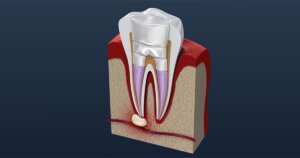
Root Canal Treatment
Root Canal Treatment What Is Root Canal Treatment? Root canal treatment, also known as endodontic therapy, is a dental procedure designed to save a tooth

Dental Pain Medication
Dental Pain Medication What Is Dental Pain Medication? Dental pain can be disruptive and overwhelming, turning even simple daily tasks into challenges. For those experiencing
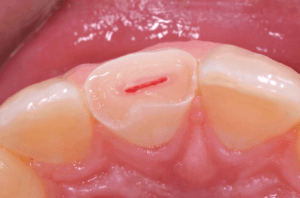
Pulpectomy
Pulpectomy What Is Pulpectomy? The pulp tissue, located at the center of the tooth, houses nerves and blood vessels, contributing to the tooth’s overall vitality.
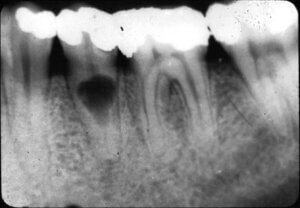
Internal Root Resorption
Internal Root Resorption What Is Internal Root Resorption? Internal root resorption is an uncommon dental condition where the inner structure of a tooth’s root begins

Cracked Tooth
Cracked Tooth What Is A Cracked Tooth? A Cracked Tooth is a break or fracture in the structure of the tooth, which can range from

Dental Sinus Infection
Dental Sinus Infection What Is A Dental Sinus Infection? A Sinus Infection, also called sinusitis, occurs when the sinuses—air-filled cavities in the skull located near

